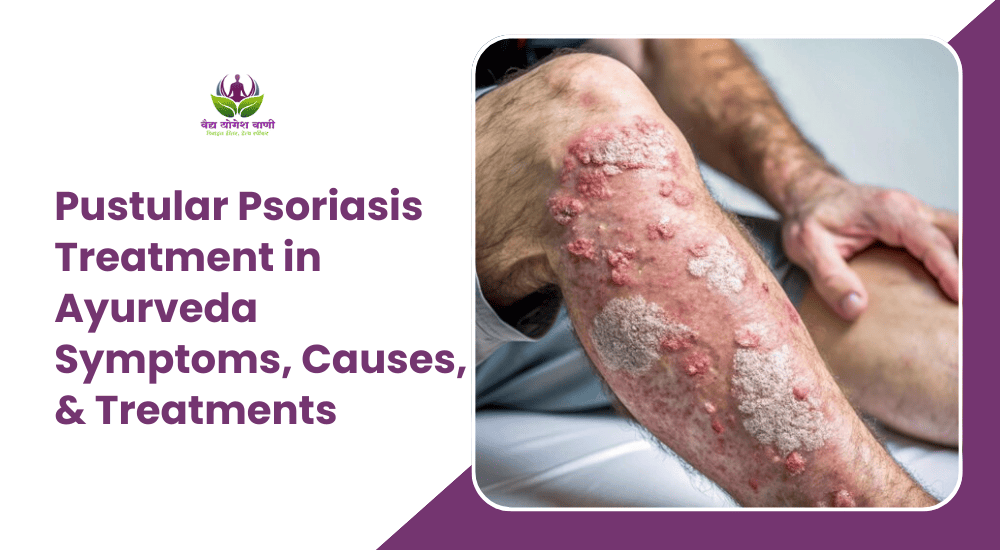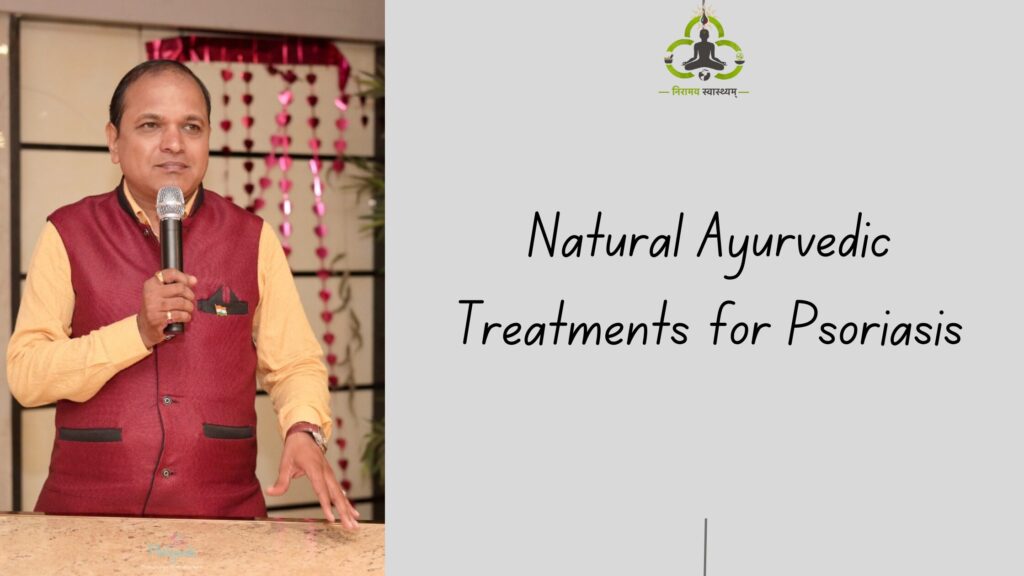Pustular psoriasis is one of the challenging skin conditions that affects the quality of life for those affected. This condition manifests with white bumps, or just white blisters full of a non-infectious type of pus, around a patch of red skin. It is not only a physically uncomfortable form of psoriasis but can also be emotionally distorting. Ayurveda, an ancient art of medicine originating in India, offers various approaches for pustular psoriasis treatment in Ayurveda, focusing on holistic healing and natural remedies.
Pustular psoriasis, as an approach for treatment, involves a holistic approach that can be used to address the manifestations and causes of this disease. Let’s take a look into symptoms, causes, Ayurvedic remedies for the treatment of pustular psoriasis, and some natural treatments that give relief to this disease.
Understanding Pustular Psoriasis
Pustular psoriasis is a kind of psoriasis that shows white pustules of non-infectious pus surrounded by red, inflamed skin. The condition can start suddenly and occur over a small or entire area of the body even though it most often begins on the hands, feet, or parts of the body.
Symptoms of Plaque Psoriasis
Plaque psoriasis is the most common form of psoriasis, and different symptoms characterize it, which can very much have a deteriorating effect on a person’s quality of life.
Here are the fundamental symptoms associated with this condition:
- Raised Red Patches: The most common sign is the appearance of raised, inflamed patches of skin. These can vary in size and tend to be sharply demarcated from the rest of the surrounding skin.
- Silvery Scales: Areas may have silvery scales of dead cells on top. The red patches are covered with silvery-white scales of dead skin cells, which can flake off and sometimes cause itching or irritation.
- Dry, Cracked Skin: The dryness and crumbling of the skin may result in possible bleeding, which will invariably make conditions worse by elevating the level of irritation discomfort, and pain.
- Itching and Burning Sensation: Scratching seems to irritate more if the pain and discomfort in the affected areas are significant in degree. The sensation is common among itching, burning, and soreness of the skin, especially when mildly irritating to highly painful.
- Thickened, Pitted, or Ridged Nails: Other patient symptoms may include nail changes. These include thickening, pitting, or ridges on the nails. The nail involvement is sometimes independent or taken along with skin manifestations.
- Swollen and Stiff Joints: Sometimes, when there is an association of arthritis with psoriasis, the patient may suffer from joint pain stiffness, and swelling usually at the fingertips, toes, and lower back.
Causes of Plaque Psoriasis
Plaque psoriasis is a highly complex autoimmune disease, and the real causes are, to date, not entirely understood. However, several factors are believed to contribute to it.
Among the primary causes and factors that activate plaque psoriasis are:
Genetic Factors
Family History: Genetics is the most significant factor in plaque psoriasis. Patients with a family history of the disease have a very high predisposition to developing the condition, so it often has hereditary components.
Immune System Dysfunction
Autoimmune Response: Plaque psoriasis is characterized as an autoimmune disease. In the disease, the immune system mistakenly attacks otherwise healthy skin cells, resulting in rapid cell turnover in the skin; it is this that leads to the characteristic plaques.
Environmental Triggers
- Infections: Stress, infections, skin injuries, and certain medications can also induce flare-ups of psoriasis: some infections, particularly streptococcal throat infection, trigger flare-ups in susceptible individuals.
- Skin Injuries: Psoriasis lesions have a characteristic association with the Koebner response, which is a phenomenon whereby trauma to the skin causes psoriasis. Sunburns, cuts, and scrapes also contribute to the development of manifestations of this condition.
Lifestyle Factors
- Stress: Most people suffer stress psychologically or emotionally which will lead to flare-ups of psoriasis. Stress will then enhance inflammation of the body and make symptoms worsen.
- Obesity: Psoriasis can be worsened through excess body weight as it can cause increased inflammation in the body. Smoking, alcoholism, and overweight might place risks for psoriasis.
Ayurvedic Perspective on Psoriasis
In Ayurveda, this expression is seen as the manifestation of the doshas in the human body, mainly Pitta, because it is considered the dosha of heat and metabolism. It emphasizes that in this ancient Indian medicine system, balance is achieved within the human body, spirit, and mind. To explore psoriasis treatment in Ayurveda, we need to look deeper into how this system regards psoriasis and its causes.
Understanding Psoriasis in Ayurveda
Dosha Imbalance
- Pitta Aggravation: Usually, psoriasis is associated with an aggravated Pitta dosha. Whenever Pitta dosha gets imbalanced in one’s body, it acts like excess body heat. Such an imbalance of Pitta dosha in the human body causes inflammation and other skin diseases, such as psoriasis.
- Vata and Kapha: Pitta is said to be the predominant dosha, imbalances due to Vata-the dosha of air and movement Kapha-the dosha of earth and water lead to this disorder as well. Dryness and coarseness may result from an excess of Vata, while Kapha can cause over-moisture and slowness in the body.
Ama Accumulation
- Toxin Build-up: In Ayurvedic, the word “ama” simply refers to toxins that are formed due to faulty digestion and unhealthy lifestyle patterns. The accumulation can take the form of diseases such as a skin condition like psoriasis. If the digestive fire is weak, then ama is formed, which further leads to inflammation and lesions on the skin.
Mind-Body Connection
In Ayurveda, it is recognized that emotions play a crucial role in health and disease. Stress and anxiety, in conjunction with emotional upheaval, may trigger Pitta and exacerbate psoriasis. Mental well-being, therefore, is seen as an important component of managing the condition.

Causes of Psoriasis in Ayurveda
Dietary Factors
- Pitta-Provoking Foods: Consuming foods that are over-spicy, salty, or oily can provoke Pitta, thus leading to inflammation. The ama may also form if the food is overly processed or is too heavy to digest.
- Incompatible Food Combinations: For reasons related to the nature of some foods, combining two of them may lead to the kind of digestion that results in an accumulation of toxins.
Lifestyle Choices
- Sedentary Lifestyle: Ama can be formed because of physiological factors such as not doing much bodily activity, which results in the slow process of digestion and slow blood circulation, which might worsen the condition and enhance the risk of ama formation.
- Poor Sleep: Lack of sleep may also affect the doshas’ balancing, particularly Pitta dosha. If this is not balanced, there is a potential risk of increasing sudden flare-ups and making your body weak.
Environmental Triggers
Extreme temperature may also trigger symptoms, depending on whether the patient is a Pitta, as well as on dry and wet conditions aggravating skin health easily. Additionally, trauma caused to the skin can stimulate a flare-up of psoriasis due to the Koebner phenomenon, which exists in both Western and Ayurvedic medicine.
Ayurvedic Remedies for Plaque Psoriasis
Ayurveda provides the patient with an all-round approach for the treatment of plaque psoriasis, directed at restoring balance within the body, improving digestion, and enhancing overall health. Here are a few Ayurvedic remedies and treatments that can be very helpful for the management of plaque psoriasis symptoms:
Herbal Remedies
- Neem (Azadirachta indica): Neem is also known to have extremely strong anti-inflammatory and antibacterial properties. It can be either in supplement form or applied topically on the skin as oil, thereby reducing inflammation and healing the skin.
- Turmeric (Curcuma longa): It has curcumin in its active form, having prominent anti-inflammatory and antioxidant properties. The herb can be administered through food, supplement, or applied as a paste, mixing it with water or oil, to affected areas.
- Aloe Vera & Ginger: Aloe vera gel has a soothing nature. Applying aloe vera topically reduces itching and burning, making you have a much healthier skin condition. Ginger enhances circulation and possesses anti-inflammatory activity. It can be taken as a warm tea or can be used in food preparation to enhance general health.
Dietary Modifications
- Pitta-Pacifying Foods: Cool foods like cucumber, melons, leafy greens, and coconut should be incorporated into the diet; try to avoid spicy, fried, and acidic foods that can provoke symptoms.
- Anti-Inflammatory Foods & Hydration: Omega-3 fatty acid-rich diets such as flaxseeds and walnuts should be included. These reduce body inflammation, and drinking loads of water flushes the toxins and helps hydrate the skin, and if so, then management of psoriasis improves.
Lifestyle Changes
Such as yoga, meditation, and deep breathing can unload some of the burdens of stress. Exercise can improve circulation and reduce inflammation. Try for moderate exercise: walk; swim; do yoga. Proper rest is necessary for optimal health and results in the regulation of all body functions, including the immune response.
Natural Supplements
Intestinal health can be shown to correlate positively with skin health. Products containing probiotics include yogurt, which may alter the balance of gut microbiota and lead to decreased inflammation. Vitamin D also plays a critical role in skin health. Even though UV light exposure contributes to the component, adequate levels of dietary intake or supplements support immune function.
Natural Treatments for Psoriasis
Psoriasis natural treatment is achieved through a combination of lifestyle modification, dietary change, and some natural psoriasis remedies. Here is a summary of effective natural treatments for managing this condition and reducing its symptoms:
Essential Oils for Psoriasis
- Lavender Oil: Lavender oil is said to be characterized by relaxing and soothing properties. It may also be used to soothe irritated skin while reducing redness in some cases. Hence, use the diluted lavender oil on an area or through a diffuser to yield feelings of relaxation and overall well-being.
- Tea Tree Oil: Tea tree oil is very well known for its antifungal, antibacterial, and anti-inflammatory properties that might reduce inflammation and prevent infections in affected areas. Always dilute by mixing with a carrier oil like coconut or jojoba oil. The patient must always be tested on a patch test before applying directly on the skin.
Oatmeal Baths
Oatmeal baths are sometimes very soothing and rather effective natural relief management of symptoms of psoriasis. Known to possess both anti-inflammatory and moisturizing properties, oatmeal baths can soothe and calm the itchy redness and dryness experienced by people with this particular skin condition.
Probiotics
Probiotics are living microorganisms, which provide several health benefits, especially with gut health. A newer research study suggests that the microbes may also be beneficial in controlling psoriasis an autoimmune skin condition characterized by rapid cell turnover or cycle of the skin with inflammation.
Conclusion
Pustular psoriasis does not have to be that complicated as such; with Ayurvedic medicinal treatments, focusing more on symptoms and root causes, it can easily be managed. The psoriasis treatment in Ayurveda helps a person to adopt a holistic lifestyle, balance doshas, eliminate toxins, and so help their condition. If a person with a loved one has pustular psoriasis, then an Ayurvedic practitioner should be consulted.
They will personally guide you and recommend treatment that is ideal for your needs. Remember, although natural treatments are good, you must monitor symptoms and seek medical counsel appropriately. With the right solution, it is possible to establish relief and improved quality of life.



